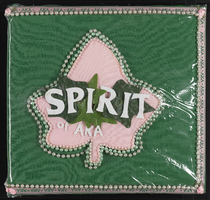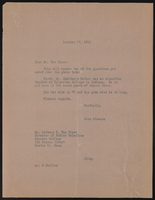Search the Special Collections and Archives Portal
Search Results

Transcript of interview with Kevin T. Orrock by Claytee D. White, December 04, 2015
Date
Archival Collection
Description
Kevin T. Orrock, president of Summerlin and vice president of Master Planned Communities for The Howard Hughes Corp., has come full circle. Born in Pioche, Nevada, he spent his early years in the San Francisco Bay area and in Pittsburgh, Pennsylvania. Graduating from a small liberal arts college, he arrived in Las Vegas in 1974 with a degree in accounting and a teaching credential, finding work in the Desert Inn accounting department. Howard Hughes owned the Desert Inn, so from 1974 Orrock has consistently been in the employ of Howard Hughes, Summa Corporation, and Howard Hughes Corporation. Orrock later earned his M.B.A. at UNLV. In this interview, Orrock focuses on Summerlin, the 22,000-acre, award-winning, master-planned community on the west side of the Las Vegas Valley. He discusses Summerlin’s physical layout, its history, its development, and its future. He specifically credits Summa Corporation’s early visionaries John Goolsby and Will Lummis for having the foresight to sell some of the company’s land in order to build the financial foundation that, in turn, permitted Summerlin’s fifty-year development plan. He also talks about the development and future of Downtown Summerlin; its balance of private, charter, and public schools; and the ways the company selects its residential builders.
Text
Rojas, Mirtha
Mirtha Rojas is originally from La Habana, Cuba and came to the United States to join his brother that had lived in Miami since Mirtha was a child. Mirtha describes her childhood as many happy moments where she learned and enjoyed musical instruments from a young age, and became a music teacher in Cuba as well. Mirtha states after her parents had died, she faced some difficult times and her brother invited her to come to Miami where she arrived in 2009 along with her nine year old daughter.
Person
Charles Duncan (C. D.) Baker Papers
Identifier
Abstract
The Charles Duncan (C.D.) Baker Papers (1951-1972) consist of clippings, correspondence, and political brochures related to the life and career of Las Vegas, Nevada Mayor Charles Duncan (C.D.) Baker. The collection also contains several scrapbooks of clippings and a mayoral plaque of appreciation from the City of Las Vegas.
Archival Collection
Geneva Stark Merwin Photograph Collection
Identifier
Abstract
The Geneva Stark Merwin Photograph Collection features photographic prints and negatives of locations throughout Pahrump, Nevada between 1941 and 1942. Primary locations include a Pahrump school and Pahrump Ranch, as well as locations in local fields and mountains. The photographs capture candid scenes of people walking to school and feeding animals.
Archival Collection
Anthony J. Franchini Papers
Identifier
Abstract
The Anthony J. Franchini Papers date from 1915 to 1996 and contain the personal and professional papers of Anthony Franchini, a musician and composer. The collection contains newspaper clippings, personal correspondence, Franchini's United States Army records, sheet music, personal photographs, and a scrapbook compiled by Franchini.
Archival Collection
Ned V. Bearden Sr. Collection
Identifier
Abstract
The Ned V. Bearden Sr. Collection (1958-1966) consists of the Rolodex for Desert York Inc., Bearden's air conditioning equipment business that operated in Las Vegas, Nevada beginning in 1946. The Rolodex contains customer names and addresses, along with installation dates and model numbers for the air conditioning equipment installed.
Archival Collection

Transcript of interview with Oscar Goodman by Claytee D. White November 10, 2014
Date
Archival Collection
Description
Oscar Baylin Goodman (1939- ) is the former mayor of the city of Las Vegas, Nevada, serving 12 years until 2011, when he swore in his wife of over 50 years, Carolyn Goodman. Oscar Goodman is the official ambassador of Las Vegas, and the chairman of the Las Vegas Convention and Visitors Authority (LVCVA) Host Committee. He is also known as one of the best criminal defense attorneys in the United States, and spent 35 years defending alleged Mob figures such as Meyer Lansky, Frank Rosenthal, and Anthony Spilotro. Goodman is the primary visionary and a member of the board of directors of The Mob Museum in downtown Las Vegas, which opened in 2012. Goodman was born June 26, 1939 in Philadelphia, Pennsylvania. He earned his undergraduate degree from Haverford College in 1961 and his law degree from the University of Pennsylvania Law School in 1964. That same year he moved to Las Vegas and in 1965 he was admitted to the Nevada State Bar. He served as Clark County?s chief deputy public defender from 1966 to 1967. Goodman was elected as mayor of Las Vegas for the first time in 1999. During his three terms (the legal limit), he contributed to the economic and cultural development of the downtown area by supporting projects such as the arts district and Union Park, a high-rise residential and business project he helped to secure 61 acres of land for. He helped to begin what he called the ?Manhattanization? of downtown, which included the construction of taller buildings for better use of the area?s prime real estate. In this interview, Goodman discusses the role of Judaism in his life, from childhood to adulthood to parenting his own four children. He touches on his involvement with Temple Beth Sholom, including serving as its president, as well as in local development projects like the Lou Ruvo Cleveland Clinic Brain Health Center, Smith Center for the Performing Arts, and Mob Museum. In addition, Goodman discusses the impact of Jewish residents on the city and its development, and mentions leaders in the gaming industry, legal profession and in politics.
Text

Transcript of interview with Gus Mancuso by Lisa Gioia-Acres, September 27, 2008
Date
Archival Collection
Description
Text

Alpha Kappa Alpha Sorority, Theta Theta Omega Chapter scrapbook: "Spirit of AKA Theta Theta Omega style"
Date
Archival Collection
Description
From the Alpha Kappa Alpha Sorority, Incorporated, Theta Theta Omega Chapter Records (MS-01014).
Mixed Content

